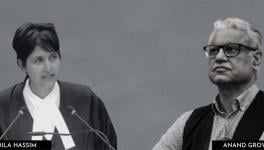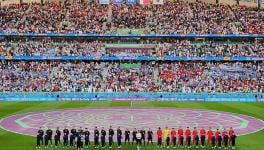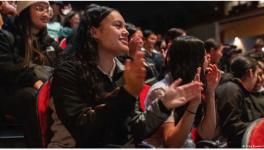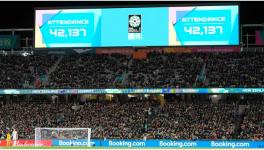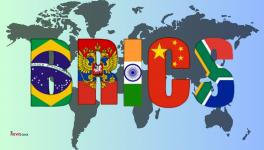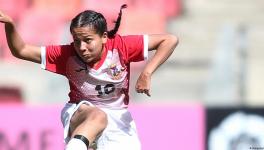African Women are World Cup's Biggest Winners
With the expansion of the Women's World Cup, nations from Africa broke new ground Down Under
When the World Cup groups were drawn, a typical malaise set in around the hopes of the African sides at the tournament.
All four of the teams had such low FIFA world rankings — Nigeria (40), South Africa (54), Morocco (72) and Zambia (77) — that they were each drawn into groups beset with European and North American powerhouses.
Further obstacles were laid in front of the players from all four countries as fights with their federations over equal pay, treatment, and in Zambia's case, accusations of sexual abuse from their head coach Bruce Mwape, blighted their build up to the tournament.
Yet, on the pitch, African players showed themselves to be athletes possessing immense talent, skill, and in many cases, untapped potential.
Morocco women's place is anywhere but the kitchen
"Go back to your kitchen!" was a cry far too familiar to the 23-strong Moroccan squad that travelled to Australia and New Zealand, for instance.
Despite the historic World Cup run the Arab country saw its men's side enjoy in Qatar, the same enthusiasm for the women's team just seven months later was sorely lacking.
It was a notable discord given the support the women's side had received when they reached the Women's Africa Cup of Nations (WAFCON) final as hosts in 2022.
But, the Atlas Lionesses put all the noise from home aside to ensure their own slice of history was just as impressive and visible on the world stage.
2022 & 2023 - Having reached the semi-finals of the 2022 World Cup with their men’s team, Morocco are the second African nation to reach the knockout stages of successive men’s/women’s World Cups, after Nigeria in 1998 (men’s) and 1999 (women’s). Rise. pic.twitter.com/eDc4s3XAuv
— OptaJoe (@OptaJoe) August 3, 2023
At their first-ever World Cup, they achieved major milestones; winning their maiden match, seeing Nouhaila Benzina become the first player to take the field at the tournament wearing a hijab, and advancing to the knockout stages at the expense of Germany with a 1-0 victory over Colombia.
Against France they were outclass in a 4-0 loss, though the team's disappointment should be shortlived after already overachieving.
"Going into the game we had all the belief that we’d be able to progress through to the next round," Rosella Ayane told DW. "But once we sit back and reflect, I think we’ll be super proud of ourselves for what we’ve achieved in this tournament.
"No one expected us to get out of the group but we did it in our first ever World Cup."
Following the Colombia win, Knorr, a bouillon company and a staple of the Moroccan kitchen, ran an advertisement with a picture of the World Cup trophy and a message that read: "Nothing other than Knorr belongs in the kitchen. Congratulations to the Lionesses of the Atlas."
Benzina, too, offered yet more recognition for athletes and young girls who wear hijabs, as the 25-year-old was recently added to the world's largest football video game, EA's FIFA 23.
'A lot of people put a lot of disrespect on African nations'
The expectations for and around Nigeria were heightened given the Super Falcons have played in all nine editions of the Women's World Cup.
Their lead-up to the competition was ruined when their training camp in Nigeria was cancelled and uncertainty reigned over whether they would be paid — with allegations that they had failed to be remunerated for two years.
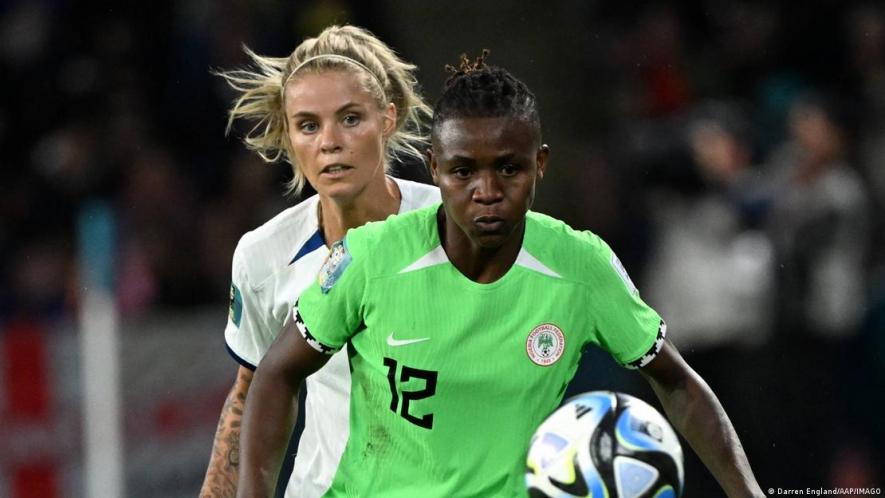
Though Nigeria lost to England on penalties, they proved they have far more to offer than a kick and run game
With FIFA having announced that each player reaching the Round of 16 would receive a minimum of US $50,000 (€45.600), forward Uchenna Kanu admitted to DW that she was unsure if the Nigeria Football Federation (NFA) would pass that money on to the players.
Although their off-field battles remained a topic of discussion throughout the tournament, the team produced some of the best attacking football of the group stages, as their quick counter-attacks and bravery helped them beat hosts Australia.
Their own Round of 16 demise against European champions England on penalties was harsh, given the African side had shaded the majority of the 120 minutes of open play.
But for defender Ashleigh Pumptre the team's play finally showed the world that African sides are capable of more than just using their "strength."
"I feel like a lot of people put a lot of disrespect on African nations," she explained to DW. "They say they're just physical or they're just fast, but you can see we have incredibly technical players too."
"I think now more people need to be talking about what we do as an overall footballing nation."
"We're not just like a kick and run, and people do make those kinds of assumptions. It's nice that all African teams at this tournament have showcased what they're all about."
Domestic South African league deserves immediate investment
South Africa, too, had a moment of reckoning.
Lacking World Cup contracts, a resolution didn't come for Banyana Banyana as the side is known, until billionaire Patrice Motsepe — owner of the South African professional team Mamelodi Sundowns and president of the Confederation of African Football — intervened and made a $320,000 donation to the team.
History makers. 💫🇿🇦
South Africa's 2023 #FIFAWWC squad cement their place as World Cup heroes. 🙌 pic.twitter.com/uIo1i3jGo8
— FIFA Women's World Cup (@FIFAWWC) August 2, 2023
The audacity of asking for recompense did not go down well with many in South Africa and after the team let a two-goal lead slip during their group match against Argentina they were bombarded on social media.
However, a sensational last-minute winner from stand-in captain and winning goalscorer Thembi Kgatlana propelled South Africa to the knockout stages.
"We've had a lot of criticism," Kgatlana said. "I've lost three family members in the last two weeks and I could have gone home, but this was too important."
Even though the team departed at the Round of 16 after losing to the Netherlands, head coach Desiree Ellis issued the following rallying cry: "To the sponsors, I don't know how you can ignore something special like this."
"I don't know how you can't assist in getting us to climb the ladder. We still have players who have a 9-to-5 job and then go to train in the evening. That's unacceptable."
Cross country support key for African nations
For Zambia there was no fairy tale ending, but they did secure their first-ever World Cup victory when they swatted aside Costa Rica in their final group match in Hamilton.
On the eve of the tournament, reports emerged that coach Bruce Mwape has been under investigation by FIFA over sexual abuse claims from his players and a further allegation was lodged at the end of the group stage claiming the head coach had inappropriately touched one of his players during the tournament.
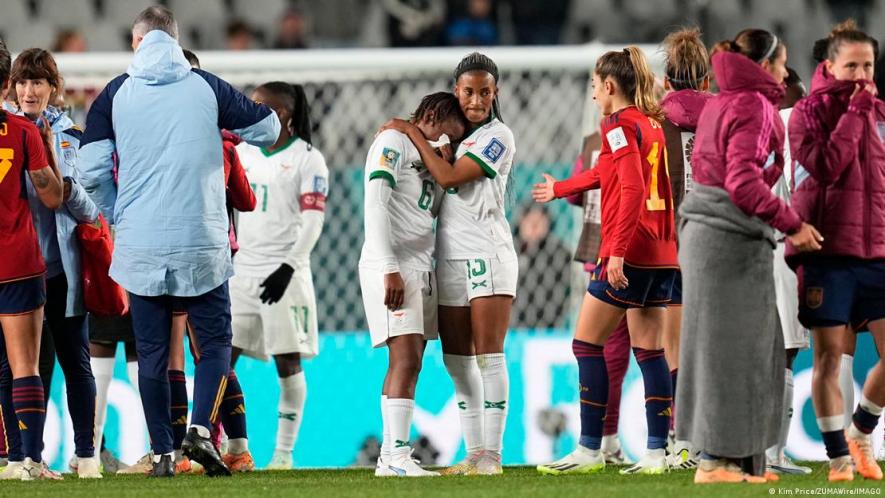
Zambia persevered in the face of the ugly controversy swirling around sexual abuse allegations leveled at coach Bruce Mwape
Fans from various African countries traveled to both Hamilton and Auckland to support the Zambian side but were dismayed upon learning of the accusations.
Supporters in the stands, like Joyce Chitepo, said they felt it all the more important to be vocal and vibrant in their encouragement for the players in light of such allegations.
"The girls should know we are here to cheer for them," the Zimbabwean-born Chitepo told DW. "They have the support of all of Africa, like every team does. We're stronger when we support each other."
Edited by: James Thorogood
Get the latest reports & analysis with people's perspective on Protests, movements & deep analytical videos, discussions of the current affairs in your Telegram app. Subscribe to NewsClick's Telegram channel & get Real-Time updates on stories, as they get published on our website.









